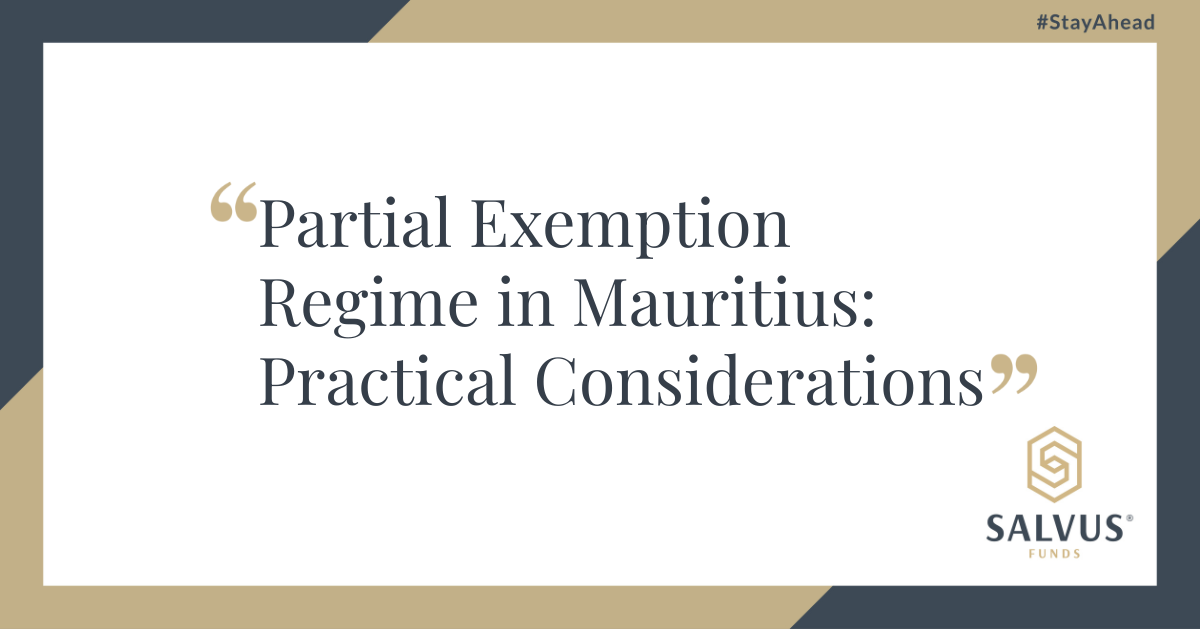Partial Exemption Regime in Mauritius: Practical Considerations
The Mauritius Revenue Authority (MRA) introduced the Partial Exemption (PE) Regime in 2019, replacing the previous Deemed Foreign Tax Credit System to align with the OECD Base Erosion and Profit Shifting (BEPS) Action 5. This tax framework reinforces Mauritius’ position as a trusted International Finance Centre by offering exemptions to companies engaged in qualifying activities. Licensed entities are generally subject to a standard corporate tax rate of 15% on their chargeable income, which applies Global Business Companies operating within the jurisdiction. However, certain businesses benefit from preferential tax treatments based on their activities and regulatory classification.
The SALVUS Mauritius team is deeply committed to staying ahead of regulatory and tax developments. Our team members actively engage in meetings, refresher workshops, and specialized training sessions to ensure continuous professional development to remain fully informed about the evolving tax landscape in Mauritius.
Throughout this article, the SALVUS Regulatory Compliance team provides comprehensive and valuable insights on the practical considerations on the PE regime, including:
1. The categories of income eligible for Partial Exemption
2. The core income generating activities (CIGA) requirements
3. The corporate climate responsibility levy (CCR Levy)
4. Partial Exemption tax calculation
5. How SALVUS can support you for your tax considerations?
We regularly share bite-sized insights on LinkedIn such as those found in this article
1. The Categories of Income Eligible for Partial Exemption
The Mauritius Revenue Authority (MRA) Statement of Practice clarifies the application of PE, such that the following investment-related income streams qualify for an 80% exemption:
| INCOME TYPE | CONDITIONS FOR 80% PARTIAL EXEMPTION |
|---|---|
| Foreign Source Dividend | Not deductible in the country of source; must meet regulatory conditions |
| Investment Adviser | Must conduct portfolio management, securities advisory, and corporate finance guidance |
| Investment Dealer | Securities trading, underwriting, acting as an intermediary in securities transactions |
| Robotic & Ai Enabled Advisory Services License | Added under Finance Act 2023, focuses on AI-driven financial solutions |
| Payment Intermediary Services (PIS) License | Introduced in Finance Act 2023, applicable to electronic financial service providers, facilitating electronic financial transactions securely |
Additionally, interest earned by a Collective Investment Scheme (CIS) or Closed-End Fund (CEF) is eligible for a 95% exemption, provided it meets the economic substance requirements.
2. The Core Income Generating Activities (CIGA) Requirements
For companies to benefit from the PE, they must meet three key CIGA conditions:
Condition 1: Conducting CIGA in Mauritius
- Core business activities must be strategic and revenue-generating.
- Must distinguish “core” activities from “non-core” administrative operations.
- Example: An Investment Dealer earns primary income from securities trading; however, administrative fees for client account maintenance do not qualify as CIGA.
Condition 2: Employing Qualified Staff
- Companies must employ a sufficient number of skilled professionals, either directly or via outsourcing.
- If outsourcing to a management company, businesses must prove adequate monitoring of delegated activities.
Condition 3: Maintaining Proportional Expenditure
- Companies must incur expenses in Mauritius that align with their business scale.
- No fixed expenditure threshold exists, but businesses must justify costs proportional to operations.
- Example: A Payment Intermediary Services (PIS) provider should maintain local infrastructure to match transaction volume.
3. The Corporate Climate Responsibility Levy (CCR Levy)
Effective 1 July 2024, the CCR Levy was introduced under the Finance Act 2023, as part of the country’s efforts to support environment sustainability and climate action initiatives. Under the CCR Levy, the tax rate for companies with turnover exceeding Rs 50 million (USD 1.1 million) would be slightly adjusted for an additional 2% of their chargeable income, shifting the effective tax rate to either 3.4% or 0.85% (depending on the activities of the companies).
4. Partial Exemption Tax Calculation
Mauritius’ PE framework significantly lowers corporate tax rates, creating an effective tax rate of 3.4% or 0.85%, depending on the exemption applied, as illustrated in the table below:
| COMPANY TYPE | STANDARD TAX RATE | CCR LEVY, IF APPLICABLE | PARTIAL EXEMPTION | ADJUSTED TAXABLE INCOME | EFFECTIVE TAX RATE |
|---|---|---|---|---|---|
| Investment Dealer, Investment Adviser, PIS, Robotic & AI Enabled Advisory Services | 15% | 2% | 80% Exemption | 20% of Chargeable Income | 3.4% |
| CIS / CEF (Interest Income) | 15% | 2% | 95% Exemption | 5% of Chargeable Income | 0.85% |
Example Tax Calculation
| Investment Dealer - 80% PE Applied | CIS/CEF - 95% PE Applied |
|---|---|
| Chargeable Income: USD 100 | Chargeable Income: USD 100 |
| Taxable Income After 80% PE: USD 20 | Taxable Income After 95% PE: USD 5 |
| Corporate Tax (15%) + CCR Levy (2%) → Effective Tax = USD 3.4 | Corporate Tax (15%) + CCR Levy (2%) → Effective Tax = USD 0.85 |
5. How can SALVUS support you in your tax considerations?
The Partial Exemption Regime in Mauritius remains a key incentive for businesses in the financial services, fostering a competitive business environment. However, firms must actively demonstrate substantial economic presence, ensuring compliance with CIGA conditions to qualify.
The SALVUS Mauritius team, composed of experienced professionals provide comprehensive support for tax computation and reporting. We offer specialized guidance on the PE regime, helping businesses determine qualifying income streams and optimize tax efficiency.
We also deliver strategic assistance in meeting CIGA requirements, ensuring compliance with OECD BEPS standards and the MRA statement of practice, while mitigating tax risks. Our expertise allows businesses to navigate complex tax regulations effectively, maintaining both compliance and operational integrity.
Contact us at mauritius@salvusfunds.com for more information. Our team is always available to address your questions and support you in achieving regulatory compliance with confidence.
#StayAhead
The information provided in this article is for general information purposes only. You should always seek professional advice suitable to your needs.

